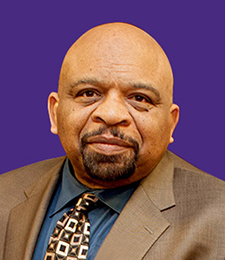The President's Column: We Can Rewrite History
June 4, 2019
But only if we fill out our voter registration forms first.

You might be surprised to learn that there’s no amendment in the U.S. Constitution that specifically gives you the right to vote. It’s an 18th century document adopted and written by founding fathers, who were exclusively white, male property owners whose property included other human beings bound in chains. (There were no founding mothers.)
The centuries-long struggle to gain universal suffrage is ongoing and has cost hundreds of thousands of lives. In 1861, Southern slave owners declared war on the United States. Four years later, that war ended with the dead numbering some 630,000 (or the equivalent of 6.3 million in today’s population.) That was just part of the cost of ending slavery and enacting the 13th, 14th and 15th amendments, which among other things held that persons born in the United States had citizenship rights and could not be denied the right to vote based on race, color or previous condition of servitude.
In the Reconstruction years following the U.S. Civil War, newly emancipated Black men (women would not secure the right to vote for another 60 years) together with their white allies, elected hundreds of African-Americans to public office, including to Congressional seats representing areas in the former Confederacy. But that progressive period was short-lived.
Former owners of slave plantations conspired to violently overthrow Reconstruction Era gains. With Ku Klux Klan nightriders who terrorized Southern Black communities, firebombings of entire neighborhoods, mob violence, and lynchings, they spawned Jim Crow laws that would last for generations. Though slavery was forbidden under law, Southern land barons imprisoned tens of thousands of emancipated slaves to serve as a prison labor workforce. (Louisiana’s notorious Angola Penitentiary has its roots in this travesty.)
For decades, Jim Crow and Klan terror prevented Black Southerners from even attempting to vote, even as other groups made progress. In 1919, the 19th amendment secured voting rights for white women. But it wasn’t until the 1950’s and 60’s that the Civil Rights Revolution, with thousands of children and elders defying police dogs and fire hoses, compelled passage of the Voting Rights Act of 1965. Southern Black women and men could finally take their rightful place among the country’s voting public.
But let’s not pretend this marked a sudden, easy embrace of democracy. In 2013, the U.S. Supreme Court gutted the Voting Rights Act’s enforcement provisions and opened the gates to a national wave of voter suppression efforts. Last year, Georgia’s Secretary of State removed 600,000 mostly African American voters from the state’s rolls. Not coincidentally, he was also the Republican candidate for Governor, running against progressive African- American Democrat Stacey Abrams. To nobody’s surprise he was elected, though Abrams nearly beat him despite the wholesale theft. And so it goes.
The efforts to disenfranchise poor and minority voters are endless. Two million incarcerated men and women—the world’s largest prison population—cannot vote. Puerto Ricans on the island are ineligible to vote for president and have no congressional representation.
Residents of majority-black Washington, D.C., with half again as many voters as the largely white state of Wyoming, have no senators or congresspersons. Sparsely populated, majority white states in the rural west each have two U.S. Senators, the same as populous states like California and New York.
But all this suppression, theft and disenfranchisement are last ditch attempts to stop the future. The U.S. Census projects that by 2045, whites will be a minority of the country’s population. That can no more be prevented than holding back the waves of the Pacific Ocean. To be clear: The white nationalism that dominates the White House and the modern Republican Party is only the most recent manifestation of the long illness infecting our country from its inception. To succeed, elites have always employed the age-old trick of convincing some white workers that their interests are best advanced not in unity with workers of color but by identifying with the same people who deny them fair pay, health care, education and retirement security.
Our union, founded by white Jewish workers, is a united multiracial, multinational political power precisely because we have refused to fall into the traps of racism, xenophobia and misogyny. But we’re only powerful to the extent that we exercise our power.
Right now, we’re living with a political crisis of emergency proportions. We are 450,000 strong, with perhaps two million family members, and our country needs all of us. It’s time for change. And we begin by getting out to register the biggest army of progressive, worker friendly voters in history.
Are you ready?

